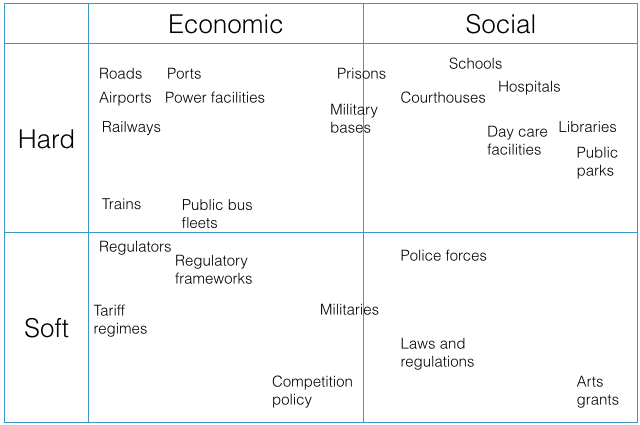"Infra-" means "below" and "-structure" means "structure". So when people talk about infrastructure, they are usually talking about the structures that allow things to operate.
Confusingly, people use the word "infrastructure" for all sorts of purposes. IT infrastructure refers to the "combined set of hardware, software, networks, facilities, etc. (including all of the information technology), in order to develop, test, deliver, monitor, control or support IT services". The World Bank has a project where they talk about "judicial infrastructure" being both the physical buildings like courts and offices where the justice system operates, but also the institutions, policies and procedures that allow it to operate. Some people even talk about "emotional infrastructure" of a family or organisation being the systems that allow people to make their feelings known and have them validated.
When I (and lots of other people) just say "infrastructure" without further clarifying, we are generally talking about the structures that underly the real economy, and allow it to operate smoothly. This sort of infrastructure is usually differentiated along two different axes: hard to soft, and economic to social.
"Hard" infrastructure usually refers to the "crunchy stuff", roads, buildings, physical assets. While "soft" infrastructure refers to institutions, regulations and systems. "Economic*" infrastructure usually refers to things like roads, power systems, ports, while "social" infrastructure refers to schools and education systems, healthcare, sporting facilities, museums and so on.
Below I have sketched out a table showing a very subjective and not-intended-to-be-perfect categorisation of different kinds of infrastructure according to where they sit on the two continua.
Hard vs. soft, and economic vs. social infrastructure
So, technically, you can call all of this stuff infrastructure. But, this isn't what most people (including me) mean when they say it. When most people talk about infrastructure, they're talking about the upper-left quadrant of my table above; the water and sanitation, power, transportation and telecommunications systems of a country. In general, the further you get away from hard economic infrastructure, the less likely people are to call it infrastructure.
The next table shows what most people mean when they talk about infrastructure, with darker shading denoting the fact that you're likely to get more strange looks if you call it infrastructure.
What most people mean when they talk about infrastructure
This blog will follow these conventions in most cases, I'll generally talk more about harder economic infrastructure. This is definitely not because I think hard economic infrastructure is more important than other kinds of infrastructure. It's partly because my experience is mostly in these areas, but it's also because sorts of economic tools and techniques I typically use are more easily and less controversially applied to this sort of infrastructure. I'll talk about the difficulty and controversy in future posts, because it's very interesting!
So, that's what I (and lots of other people) talk about when we talk about infrastructure. I hope you find it interesting!
* The term "economic infrastructure", as opposed to "social infrastructure" is not universally agreed on. Some people refer to power, water, telecoms and transportation systems just as "infrastructure", while schools et al get bundled into "social infrastructure". Some people also use "economic infrastructure" to refer to the economic systems of a country; the central bank, the banking system, etc. Confusing, no?

